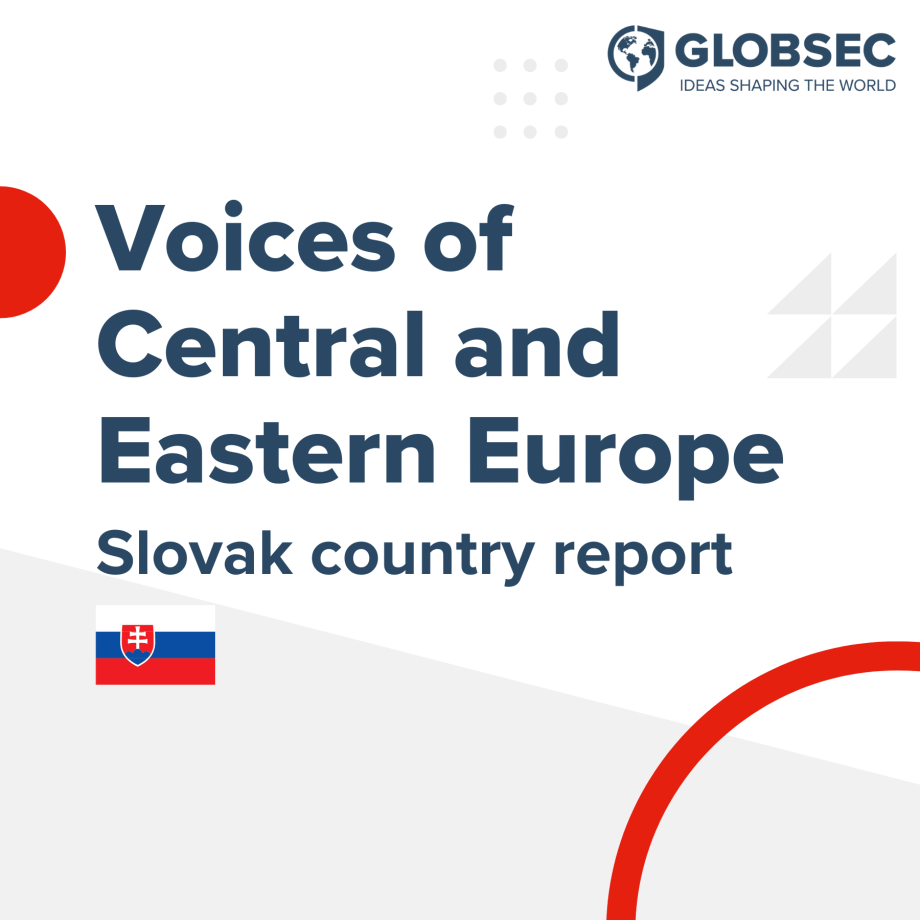Perception of democracy and conspiracies in Slovakia

The fragility of democracies is an increasing concern amid a period of global instability and insecurity reinforced by the COVID-19 pandemic. Against this backdrop, a shared belief in good governance, a reliable and trusted news media and government institutions, and an engaged civil society are now all crucial for democratic societies to get back on their feet, overcome societal and economic challenges of today and the near future.
GLOBSEC’s report, Voices of Central and Eastern Europe: Perceptions of democracy & governance in 10 EU countries, provides unique insight into public satisfaction with the functioning of democracy and governance in ten Central and Eastern European countries: Austria, Bulgaria, Czechia, Estonia, Hungary, Latvia, Lithuania, Poland, Romania and Slovakia.
This country report focuses specifically on Slovakia – a nation that experienced a turbulent path to democratisation. Although Slovakia saw a government with autocratic tendencies rule, by and large, during the 1990s, the country now has a record of economic growth behind it and is a fully established member of the European Union and NATO.
This tempestuous past might have, however, taken its toll based on our survey’s findings. Support for democracy and commitment to democratic freedoms in the country is far from absolute. And buy-in to conspiracy theories is the highest in the region. Slovaks, moreover, express a heightened sense of threat perception that is directed towards various actors and groups, ranging from the US to migrants and minorities. The population, nonetheless, values its EU membership and does not see its government as overly intruding on media freedoms.
Read more in the report below, these are our key findings:
- Support for liberal democracy is not straightforward in the region. Preference for liberal democracy, as opposed to autocratic rule, is endorsed by over 50% of respondents in only 5 of 10 countries. In Slovakia, 49% of respondents express a preference for liberal democracy, with 38% instead favouring a strong leader with autocratic tendencies.
- Central and Eastern Europeans perceive income inequality to be strongly prevalent in society and hold the view that systemic favouritism benefits individuals with access to elites and those with higher incomes. On average, 70% in the region believe that those with elite political contacts are favoured in society. In Slovakia, 77% of respondents believe that those with elite political contacts are favoured over others. And 46% of Slovaks, the highest in the region, believe that migrants are favoured.
- Only a minority, 28%, of CEE respondents agree, on average, with the narrative that their values are under threat due to the “West”. But within Slovakia, 50% of respondents feel that the “West” threatens their values and identity and 53% identify the US specifically as a threat.
- Trust in the media in the region averages around 44%. At the same time, more than 70% of respondents in Austria, Czechia, Romania, and Slovakia perceive the media as rather or completely free of influence. This perception that the media is free of influence stands at 79% in Slovakia.
- Respondents susceptible to believing conspiracy theories and disinformation narratives demonstrate a particular propensity for favouring autocratic leaders over liberal democracy and are more willing to trade away democratic freedoms for other social and financial benefits. Slovakia has the highest degree of proneness to believe in conspiracy theories in the region. Around 64% of Slovaks, also the highest percentage in the region, express a willingness to trade away freedoms for other benefits.
- Slovakia and Bulgaria are the most conspiracy theory- and misinformation-prone countries in the region. Around half of respondents agreed, on average, with statements presented in the survey that incorporated conspiratorial thinking and misinformation. A total of 60% of Slovaks hold the belief that issues of world affairs are not decided by elected leaders but by secret groups aiming to establish a totalitarian world order. 51% of Slovaks, furthermore, agree with the conspiratorial notion that Jews have too much power and secretly control governments and institutions around the world.

